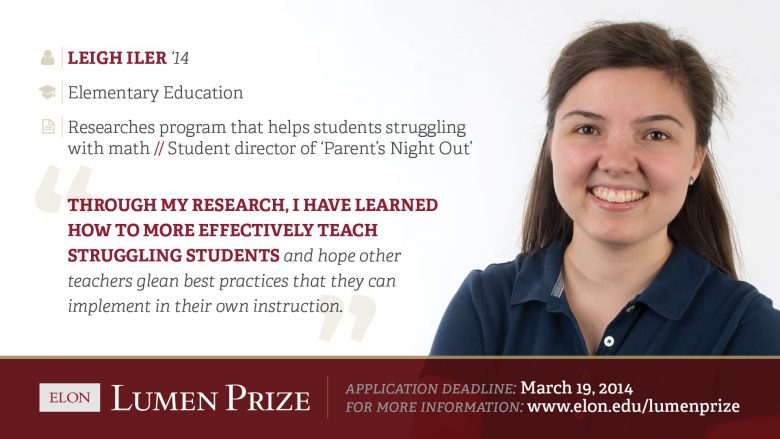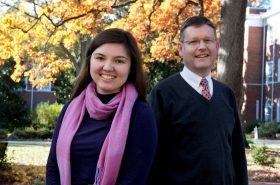Elon University senior Leigh Iler developed strategies for a middle school tutoring program as she studied an emerging technique for deciding whether students require special education.
 By Sarah Mulnick ’17
By Sarah Mulnick ’17
In typical school settings, when a child has struggled to learn basic math or reading concepts, teachers traditionally have measured the difference between the student’s IQ and his test scores to determine the need for special education services due to learning disabilities.
However, a relatively new approach to helping those who fall behind – Response to Intervention, or “RTI” for short – is taking hold in many classrooms around the United States. Educators in these classrooms devise specialized and individualized instruction for students when they show signs that they may need help.
Rather than depend on discrepancies between IQ and test scores, it’s the results of extra efforts that teachers and specialists cite when recommending special education. There’s now growing interest among scholars and policy makers in studying RTI’s effectiveness with an eye on improving the process.
Elon University senior Leigh Iler is one such undergraduate researcher.
The North Carolina Teaching Fellow and elementary education major is using Elon’s top prize for academic research and creative achievement to create and assess a tutoring program at Graham Middle School in Burlington, N.C. Her work is the latest to be featured this year in an ongoing series of E-Net profiles on Lumen Scholars in the Class of 2014.
With mentoring from Associate Professor Stephen Byrd, Iler has designed and implemented new scripts for math tutors to follow as they work in a sixth grade classroom. The students struggle especially with fractions, Iler said, which can lead to heightened frustration later in their studies as foundational math gives way to advanced concepts.
“My hope is that the scripts I’ve created can become useful resources for classroom teachers,” Iler said, noting how educators must often add tutoring strategies to their lists of other professional responsibilities. “By allowing myself to research how students learn these concepts, I was able to produce (strategies) so that teachers don’t have to do as much behind-the-scenes work.”

And where RTI research is noticeably missing, Iler said, is in the middle grades, particularly with math. She aimed her research into those areas following discussions with Byrd and Janice Richardson, an associate professor of mathematics and education whom Iler credited with first proposing this research topic to her.
The Lumen Prize, awarded for the first time in 2008, provides selected students with a $15,000 scholarship to support and celebrate their academic and creative achievements. Lumen Scholars work closely with faculty mentors to pursue and complete their projects.
Efforts include coursework, study abroad, research both on campus and abroad as well as during the regular academic year and summers, internships locally and abroad, program development and creative productions and performances.
“I think the Lumen Prize and my research in general has allowed me to develop a different perspective on learning and teaching,” Iler said. “It’s allowed me to better question the world around me and my own teaching practices, and make changes based upon that.”
Byrd worked with Iler to prepare her Lumen Prize application and, later, the scripts tutors would use in Graham Middle School and at the university’s Summer Learning Academy for local school children.
“She always gets done what needs to get done,” Byrd said. “She is on a strong trajectory as a researcher, and she’s a good teacher. You can count on high-quality, professional work from her.”
Iler will student teach this spring at Andrews Elementary School in Burlington. Her Elon experiences have included leadership and volunteer positions InterVarsity and Parent’s Night Out, a program that provides babysitting services for faculty and staff of the university one night each month during the fall and spring semester.
In November, Iler was awarded the Outstanding Mathematics Education Award for the Central Region of North Carolina at the annual N.C. Council of Teachers of Mathematics conference. She presented findings at the conference from her recent Summer Undergraduate Research Experience, where she piloted the scripts for the Summer Learning Academy.
Iler plans to work as a teacher in North Carolina after graduation in May to fulfill her commitments as a Teaching Fellow. If graduate school is in the future, she said, she wants to do it after she has been in the field, and can therefore apply the knowledge she gains through research into her own classroom.
“I want to become a teacher to help students,” Iler said. “I really want to have a positive influence on their lives and allow them to see that learning is a lifelong process.”


